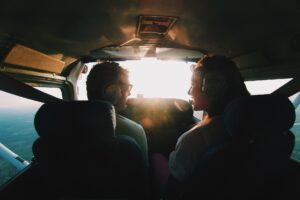Pilot Life: Staying Healthy On The Road and Over the Years
Life in the Skies: Not Always “Living the Dream”
Balancing Diet, Exercise, and Sleep: Maintaining a Healthy Weight
 Many pilots struggle to maintain a healthy weight. According to Harvard doctors, maintaining a healthy weight lowers the risk of heart disease, stroke, diabetes, high blood pressure, and many cancers. Airline pilots may eat too much airport fast food, and corporate pilots may be provided endless high-calorie crew meals while sitting in FBOs for hours at a time. Eating healthy – and not overeating – while traveling is a major issue. Arriving at a hotel at midnight can mean only typical fast-food options are available, so planning meals ahead is critical.
Many pilots struggle to maintain a healthy weight. According to Harvard doctors, maintaining a healthy weight lowers the risk of heart disease, stroke, diabetes, high blood pressure, and many cancers. Airline pilots may eat too much airport fast food, and corporate pilots may be provided endless high-calorie crew meals while sitting in FBOs for hours at a time. Eating healthy – and not overeating – while traveling is a major issue. Arriving at a hotel at midnight can mean only typical fast-food options are available, so planning meals ahead is critical.
Dehydration also presents increased risks for pilots. Symptoms are amplified due to crew members operating in the dry environment of high altitudes, including headache, fatigue, cramps, sleepiness, and dizziness. Lack of scheduled breaks, short turn-around times, and lack of available private restrooms can cause pilots to neglect drinking enough water.
Being sleep deprived is another challenge pilots face with maintaining a healthy weight. Generally, people who don’t get enough sleep weigh more than people who do for several reasons:
- Sleep-deprived people may be too tired to exercise
- People who sleep less are awake longer and have more awake hours to eat
- Sleep deprivation can disrupt key hormones, causing people to be hungrier during the day, resulting in higher calorie intake.
Pilots who go back and forth from coast to coast may find it challenging to find a consistent sleep or meal schedule. If you are struggling with diet, exercise, and getting sleep, talk to your health care provider about ways to improve your diet and routines.
Staying Healthy On The Road and Over the Years

There are known and unknown risks being near loud engines, huge quantities of fuel, and at high altitudes. The National Institute for Occupational Safety and Health (NIOSH) has identified a list of working environment and health concerns that aircrews may encounter, including:
- Cabin air quality
- Cancer
- Circadian rhythm disruption (jet lag)
- Communicable diseases
- Cosmic ionizing radiation
- Job stress
- Musculoskeletal disorders
- Noise/hearing loss
- Pesticides
- Reproductive health
- Respiratory symptoms and diseases.
Some health concerns may be lessened with protective measures. Always wear ear protection, sunscreen on your face and long-sleeved shirts to protect your skin, and maintain a healthy weight.
Pilot Problems With Substance Abuse
Our Solutions to Staying Healthy - Wherever You Are
There are strategies to hedge against these health concerns. Adopt as many as possible, so you can keep the complaining to the inoperative APU or a long sit an FBO.
Invest in some tech
Technology is on your side. You can watch your calorie burn, steps taken, heart rate, and blood pressure using wearable devices and smartwatches. Measure your health, so you can manage it. In these times of teledoc appointments and zoom calls, you can schedule a doctor visit anywhere. There are apps to track nutrition, measure your sleep, and even track your water intake.
Meal Prep
Pack food so you’re not at the mercy of terminal restaurants, leftover passenger meals or the hotel grab-and-go. It’s a lot of work, but the benefits go beyond saving money. It’ll save your health. Of course, for long trips or nights out with the crew, you’ll want to buy a tasty meal. But if you’ve been eating some home cooked meals, you’ve earned it.
Exercise
Take advantage of the hotel gym. If it’s closed or you don’t want to leave the room, you can do a live workout on your iPad. (Tip: Be a kind hotel neighbor – ask the front desk for a ground floor room if you’re going to be doing jumping jacks). The Department of Health and American Heart Association recommend at least 150 minutes per week of moderate-intensity aerobic activity. Or, 75 minutes per week of vigorous aerobic activity. Use a combination of both spread throughout the week.
Sleep as much as you can
It would be unrealistic to expect to always get 8 hours of sleep in hotel room with late arrivals and early shows. Give yourself the best opportunity to sleep by creating a dark and cool environment. If you expect any issues with the room or noise neighbors, request a new room as soon as you can, before you unpack. Take advantage of deadheads, airport sits, and crew rest rooms as well, with a neck pillow that works best for you (Hint: It may not be the standard c-collar travel pillow).
Wellness Shots, Vitamins and Supplements
Talk to your doctor about what vitamins or supplements would benefit your specific health situation. “Wellness Shots” have become popular, offering immunity boosts and anti-inflammatory effects. While they won’t provide miracles, nutritionists agree they can benefit your health and body. Look for tumeric, ginger, lemon & cayenne, and wheatgrass. They aren’t cheap, and be warned, the taste might make you cringe for a second.
Stay Hydrated
The Federal Air Surgeon recommends 2 quarts, about four 16oz bottles, every 24 hours. Drink when you’re not thirsty. Be mindful of alcohol and caffeine consumption, which are diuretics that cause increase urination and water loss. Water is usually enough, but sports drinks or electrolyte mixes are also an option to rehydrate, especially if the cause of dehydration is heat.
Protect Your Ears
Make sure your headset it providing adequate noise cancellation. Carry earplugs in your flight bag for walk-arounds next to loud APUs.
Protect Your Skin
Consult this study or dig up your aircraft windscreen module and see how it measures up against UVA radiation. Most will provide protection, but not all, and higher altitudes can reduce that protection. For your eyes, choose sunglasses that feature UVA protection. Even some contact lenses offer 90% UVA protection. If you’re high risk for skin cancer, consider long sleeve shirts.
Use Your Time at Home Wisely
As mentioned above, the time away from home can cause many stresses in a pilot’s life. However, with several consecutive days off, and no work to think about, there should be ample opportunity for quality time with family and friends. Catch up on rest, and enjoy entire days with loved ones. You may have to fix the things that broke while you were gone, but make an effort for recreation. Many pilots feel while time at home may be less, it can be more quality time than someone with a 9-5 job. You can do more than put the children to sleep and see them off to school in the morning.





